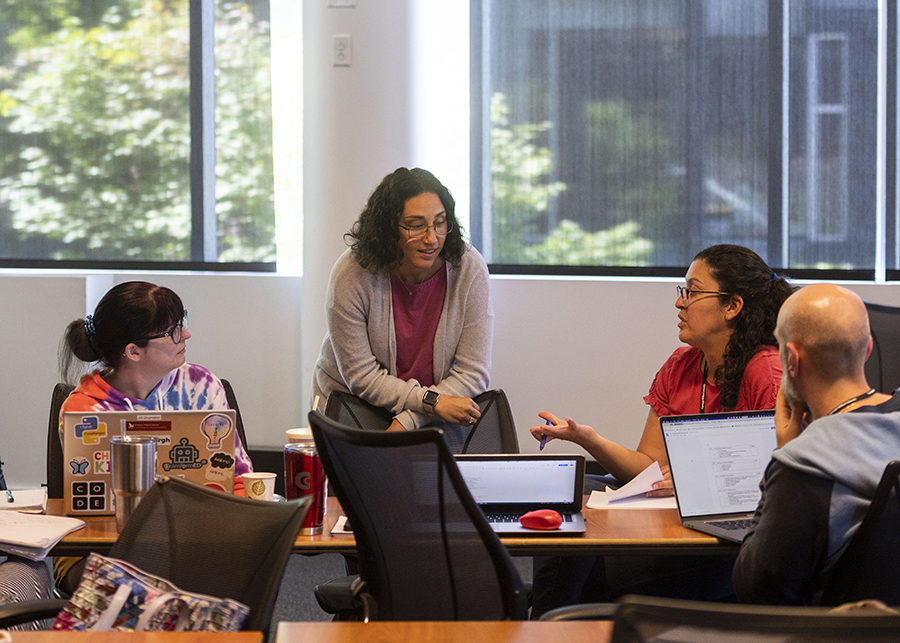SCS Faculty Give High School Teachers a Crash Course in AI
Aaron AupperleeTuesday, August 16, 2022Print this page.

As Stephanie Rosenthal finished a whirlwind explanation of how artificial intelligence is infused in applications across the internet and in major tech companies, she paused and looked at her students. But instead of being the typical room full of graduate or undergraduate students, it was a room full of teachers listening and taking notes.
"Does any of that help you?" asked Rosenthal, an assistant teaching professor in the Computer Science Department (CSD).
This summer, the School of Computer Science hosted 28 teachers from 24 districts in Western Pennsylvania for the school's first-ever, in-person AI workshop designed specifically for teachers. The educators came to campus during the last week of June and worked with faculty from across SCS to learn about AI through hands-on activities and develop interactive lessons that they can take into their classrooms this fall.
"AI is reaching students in so many ways," Rosenthal said. "It is important to give high school teachers the tools to teach students what is going on and how to make good choices."
Lessons about AI, machine learning, algorithms and other computer science-related topics are more important than ever as these skills will increasingly become part of future jobs and the technology shaping everyday life.
Rosenthal and Patrick Virtue, an assistant teacher professor in CSD and the Machine Learning Department, ran the workshop. The teachers heard from SCS faculty including Matthew Johnson-Roberson, the director of the Robotics Institute, and Roni Rosenfeld, the head of MLD. Johnson-Roberson gave a presentation on artificial intelligence and autonomous vehicles, while Rosenfeld shared details about COVIDcast.
Teachers also heard about CS Academy from Erin Cawley and Tim Barnes, and the Summer Academy for Math and Science from Shernell Smith and Rowshan Lang. They visited the Girls of Steel practice facility for a demo and ran through an AI activity with Fred Martin, associate dean for teaching at the University of Massachusetts, Lowell. Other topics covered in the workshop included machine learning, symbolic AI, computer vision, natural language processing and AI ethics.
"We focused on important lessons like AI ethics and how to use it safely," Virtue said. "AI is part of our lives, and it is critical we understand how it can help us and how it can go wrong."
About a third of the teachers came from underserved districts where students might not have ready access to lessons about AI. Other teachers work in districts with established programs in linear algebra, calculus, data science and computer science.
Brian Herring, a tech ed teacher at Canonsburg Middle School, hopes to provide his students with an awareness about AI and plant seeds that may sprout into further interest. He said the chance to collaborate with other teachers and SCS faculty to build activities and lessons was helpful. Sabrina Shaver, a teacher at City Charter School in Pittsburgh, hopes to start an elective course in AI.
"The workshop showed me how to introduce the topics in a way that my students can understand," Shaver said.
A grant from The Grable Foundation provided a stipend for the teachers, who attended the workshop at no cost. The workshop was sponsored by the National Science Foundation through its AI Institute for Collaborative Assistance and Responsive Interaction for Networked Groups (AI-CARING) and the SCS Dean's Office.
Aaron Aupperlee | 412-268-9068 | aaupperlee@cmu.edu
